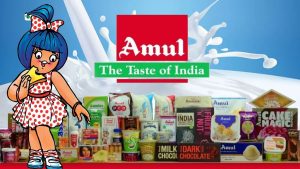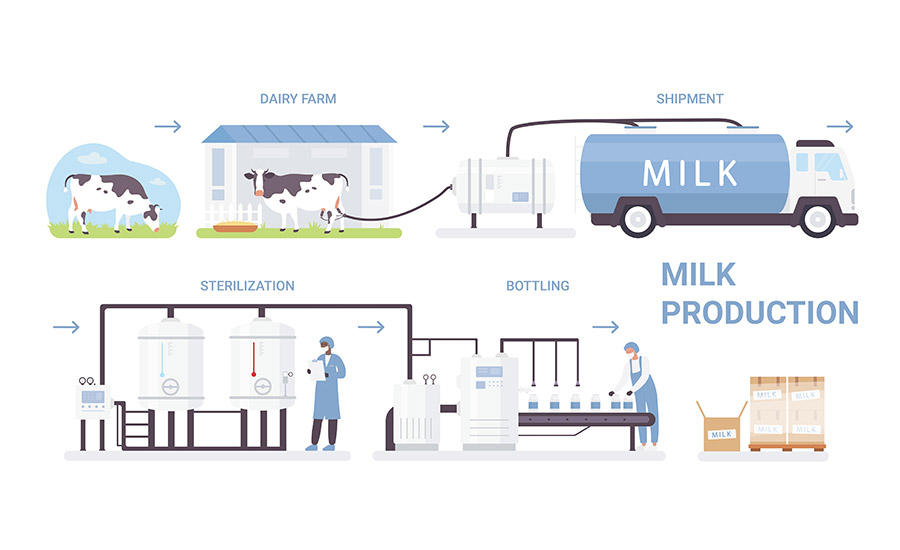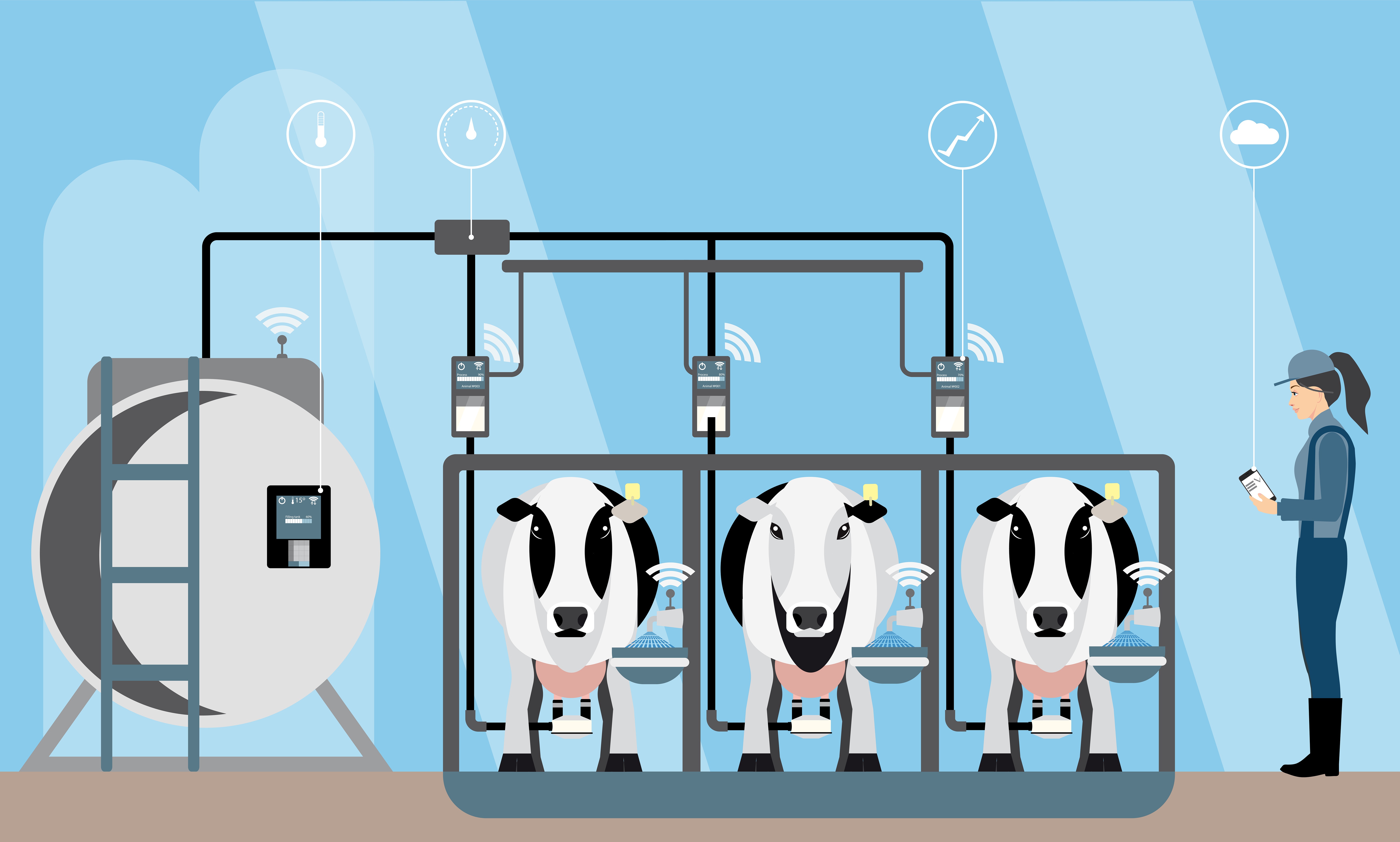
Introduction
Milk is one of the most widely consumed dairy products worldwide, but it is also highly perishable.
Rich in essential proteins, vitamins, and minerals, it serves as a staple in many diets. However, its composition makes it an ideal medium for bacterial growth if not handled and stored at the correct temperature. Once extracted, milk begins to deteriorate due to microbial activity and enzymatic reactions, leading to spoilage, health risks, economic losses, and food wastage. To preserve its quality and ensure consumer safety, Cold Chain Management plays a crucial role. This system maintains controlled temperatures throughout the entire supply chain, from milking to final consumption, by implementing a series of temperature-controlled steps, including on-farm cooling, refrigerated transportation, and proper storage at processing facilities, retail outlets, and households. By effectively managing the cold chain, milk’s freshness, nutritional value, and safety are preserved, benefiting farmers, processors, retailers, and consumers alike.
For farmers, adopting proper cold chain practices ensures better milk quality, reduces losses, and increases their earnings. It also helps them meet food safety regulations and sell their milk at a higher price in premium markets. Dairy processors and retailers also benefit from an efficient cold chain, as it minimizes spoilage, extends shelf life, and ensures compliance with food safety standards. Moreover, consumers receive fresher, safer milk with better taste and nutritional value.
With increasing global demand for high-quality dairy products, cold chain management has become more important than ever. Advances in refrigeration technology, monitoring systems, and logistics have improved the efficiency of milk storage and distribution. By implementing best practices in cold chain management, the dairy industry can enhance sustainability, reduce food waste, and ensure the delivery of safe, high-quality milk from farm to table.

- Why is Cold Chain Management Important for Farmers?
For dairy farmers, proper cold storage and handling of milk can lead to multiple benefits:
- Prevents Milk Spoilage and Reduces Losses
– Fresh milk starts to degrade immediately after milking. If left at room temperature, bacteria multiply rapidly, causing spoilage.
– Proper cooling slows down bacterial growth, increasing shelf life and reducing milk wastage.
- Increases Profitability
– High-quality milk fetches better prices in the market.
– Farmers using bulk milk coolers (BMCs) and instant chillers can negotiate better rates with dairy processors and cooperatives.
– Less spoilage means more sellable milk, improving overall income.
- Ensures Compliance with Safety Standards
– Many milk buyers and dairy companies reject milk that does not meet safety standards due to contamination or poor handling.
– Following cold chain practices helps farmers qualify for premium buyers and export markets.
- Builds Farmer Reputation
– Consumers today demand fresh, high-quality, and safe milk.
– Farmers who maintain good cold chain practices can build a strong reputation and long-term relationships with buyers and cooperatives.

- Key Steps in Cold Chain Management for Dairy Farmers
1. Immediate Cooling After Milking
– Freshly milked milk should be cooled to 4°C within 2 hours to prevent bacterial growth.
– Farmers can use:
✔Bulk Milk Coolers (BMCs) – Large tanks that cool and store milk. Ideal for dairy cooperatives and large farms.
✔Instant Milk Chillers – Quickly cools milk before transportation. Useful for small and medium farms.
✔Insulated Milk Cans with Ice Packs – A cost-effective option for small farmers without electricity.
2. Proper Storage at the Dairy Farm
– If milk is not immediately sold, it should be stored in chilled storage tanks at blow 4°C.
– Avoid keeping milk in open containers, as exposure to air can cause contamination.
3. Hygienic Milking Practices
– Dirty hands, unclean utensils, or poor hygiene can introduce bacteria into milk, making cold storage less effective. – Farmers should:
✔ Wash hands and use clean equipment before milking.
✔ Use stainless steel buckets instead of plastic to prevent contamination.
✔ Cover milk storage containers to prevent dust, insects, or dirt from entering.
4. Refrigerated Transportation to Dairy Processing Units
– Once collected, milk should be transported in insulated or refrigerated tankers to maintain temperature.
– GPS tracking and temperature sensors help monitor milk conditions during transport.
5. Cold Storage at Dairy Processing Plants
– After pasteurization, milk must be stored at 4°C or below before being processed into products like butter, cheese, and yogurt.
6. Retail Cold Chain and Consumer Awareness
– Milk must be kept in refrigerated displays at retail stores.
– Consumers should be educated on proper storage (e.g., keeping milk in the fridge, not at room temperature).

- Technologies That Can Help Farmers in Cold Chain Management
🚛Refrigerated Milk Tankers – Ensure milk stays fresh during transport.
🌡IoT-Based Temperature Sensors – Help track milk temperature in storage and transport.
☀Solar-Powered Coolers – Useful for farmers in rural areas with unreliable electricity.
🔗Blockchain Technology – Helps track milk from dairy farm to consumer, ensuring authenticity.
📱Mobile Apps for Cold Chain Monitoring – Allow farmers to monitor temperature, quality, and transportation in real-time.
- Challenges Faced by Farmers in Cold Chain Management
While cold chain management has many benefits, farmers often face difficulties in implementing it:
🚧High Cost of Cooling Equipment – Bulk milk coolers and refrigeration systems require investment, which may be challenging for small farmers.
⚡Unreliable Electricity Supply – Power cuts in rural areas affect milk cooling. Solar-powered alternatives can help.
📢Lack of Awareness – Many small farmers are unaware of the importance of cold chain management and good hygiene practices.
🏭Limited Access to Refrigerated Transport – Many farmers rely on traditional transport, which does not have cooling systems.
To overcome these challenges, government support, dairy cooperatives, and private sector investmentare essential to provide affordable cooling solutions, training programs, and financial assistance for small farmers.
- Future of Cold Chain Management in Dairy Farming
With growing consumer demand for high-quality milk, the future of cold chain management looks promising. Key advancements include:
✅Use of AI and IoT in Cold Chain Monitoring – Real-time tracking of milk temperature, reducing spoilage.
✅Solar-Powered Bulk Milk Coolers – Cost-effective cooling solutions for off-grid farms.
✅Expansion of Farmer Cooperatives – Helping small farmers access shared cold storage facilities.
✅Blockchain for Transparency – Digital tracking of milk from dairy farm to consumer to ensure safety.
- Conclusion
Cold chain management is vital for dairy farmers to ensure milk remains fresh, safe, and of high quality. Proper cooling, hygienic milking, refrigerated transport, and modern technology can help farmers reduce wastage, increase profits, and build consumer trust.By investing in the right infrastructure and following best practices, farmers can improve their earnings and contribute to a healthier, more sustainable dairy industry.

Chirag Singh1, Varsha Vihan*2 and Bhawna3
1Department of Livestock Product Technology, College of Veterinary Science and Animal Husbandry, U.P. Pandit Deen Dayal Upadhyaya Pashu Chikitsa Vigyan Vishwavidyalaya Evam Go-Anusandhan Sansthan, Mathura, Uttar Pradesh
2Dairy Technology Division, ICAR-National Dairy Research Institute, Karnal, Haryana
3Department of Livestock Product Technology, College of Veterinary and Animal Sciences, Sardar Vallabhbhai Patel University of Agriculture and Technology, Meerut, 250110, India
Corresponding author: Email- *varshavihan16495@gmail.com
You can now read the most important #news on #eDairyNews #Whatsapp channels!!!
🇮🇳 eDairy News ÍNDIA: https://whatsapp.com/channel/0029VaPidCcGpLHImBQk6x1F

















